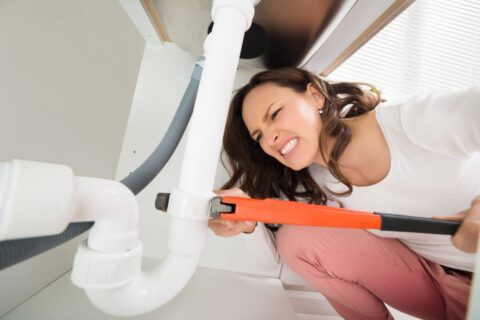Common Springtime Plumbing Problems
Winter is hard on your plumbing. The constant temperature fluctuation and possibility of freezing conditions can easily turn minor issues into major issues. On top of that, the proliferation of plant life and animal activity only complicate matters. Once the temperatures begin to increase, and your pipes expand a bit due to the weather change, you’re far more likely to notice an issues and contact your local plumbing expert. With that in mind, here are some of the most common springtime plumbing problems and what to do until your plumber arrives.
Common Springtime Plumbing Problems
Leaks
During the winter, your pipes contract slightly due to the colder conditions. If you experience a freeze, the expansion of the frozen water will push against the contracted pipes causing strain. Even if your pipes don’t bust during the winter as a result of a freeze, it doesn’t mean the pipes weren’t damaged.
The expansion of the ice could form small, hairline fractures in your pipes. Thanks to the cold weather, the pipes stay slightly contracted. This keeps the leak manageable, and you may not notice a difference. However, when warm weather hits, your pipes will expand, making that crack much bigger.
At this point, if you have a serious leak, then you will have to turn off your main water line unless you’re able to turn off water access to the source of the leak. Mayb you do have to turn off your main water line. Then you should contact an emergency plumber to restore your access to fresh water as soon as possible.
Backed Up Pipes
Water-logged soil and new plant growth are both capable of messing with your pipes. The sheer weight of soaked earth can cause older pipes to collapse in on themselves. With nowhere to go your water and waste will eventually back up into your home, causing serious damage if allowed to progress. Larger roots can also cause pipes to collapse by forcing their way through the pipe in their search for water and nutrients.
Until your plumber can fix the source of the congestion, it is imperative that you avoid putting anything down any of your drains. You shouldn’t flush a toilet, use a sink, run a dishwasher, do laundry, or even pour last month’s milk down the sink until the collapse has been addressed. If you keep using your plumbing normally, then you’ll have a much bigger mess on your hands.
Clogged Gutters
Spring is a crazy time for the flora and fauna living around your home. Between pollen, birds’ nests, small mammals looking for a cozy place to stay your gutters end up with a lot of extra houseguests. Some of this can’t be helped without harming the local ecosystem. But there are a few things you can do to ensure your gutters properly divert water from your house throughout the spring.
Start by calling your local animal control if you’re aware of animals nesting on your roof or in your gutters. They may be able to remove some of them to a safer location. If the nests cannot be removed, ask your animal control officer to mark the location of the nest(s). From there you can contact a gutter cleaning service and instruct them to work around the marked areas.
Although these are the most common springtime problems, there are plenty of issues that could crop up in the spring. The best way to avoid them is to maintain a regular maintenance schedule starting with an annual inspection every summer. Fortunately, New Generation Plumbing offers top residential plumbing in Pasadena ensuring that your pipes will receive the maintenance and oversight they need to stay functional year-round.


